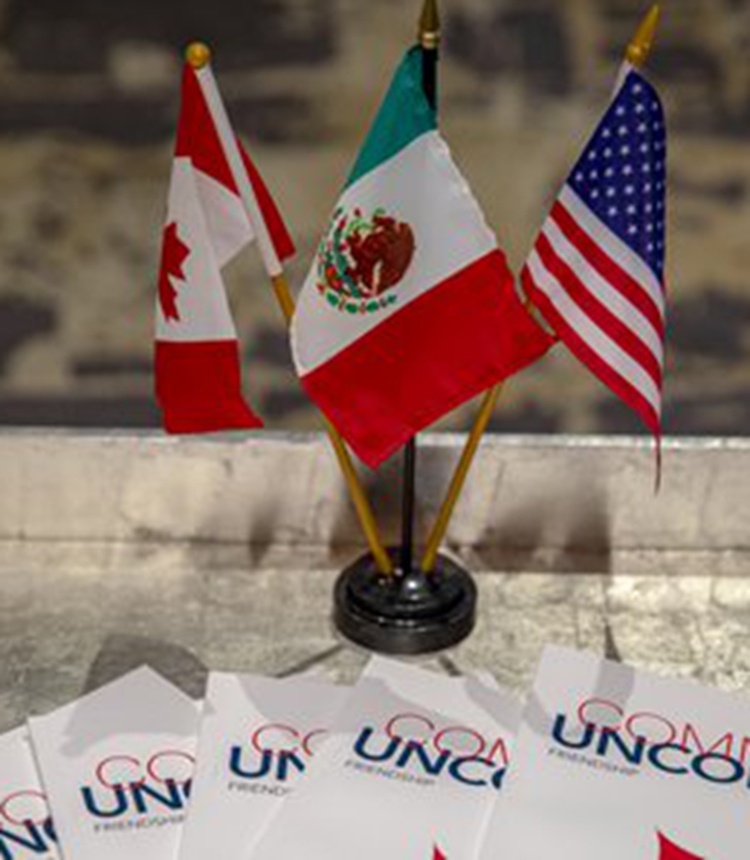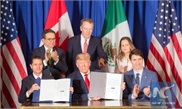North American trade pact takes effect in world ravaged by pandemic
USMCA launched amid virus outbreak
The USMCA trade agreement has been hailed as the start of a new era in North American commerce. Unfortunately, it officially launches in the middle of a pandemic.

But that was before COVID-19 broke out. Now, the borders between the countries are partially closed, and the IMF is forecasting severe drops in all three North American economies in 2020.
The pact replaces the 1994 North American Free Trade Agreement (NAFTA) and was negotiated after attacks by US President Donald Trump, who said it destroyed American jobs and was unfair.
The "entry into force of USMCA is a key part of a broader trade agenda, the goal of which is to pursue free, fair and reciprocal trade with all our trading partners," US Deputy Under Secretary for International Trade Joseph Semsar said Tuesday.
"We believe USMCA will ensure North America remains the world's economic powerhouse, and that the agreement will create high-paying jobs for Americans, Canadians and Mexicans," he said in a videoconference organized by the Washington-based Wilson Center.
Trump pushed Canada and Mexico to come to the bargaining table, and following marathon talks, the three parties signed the initial version of the agreement in November 2018.
Mexico ratified it in December 2019, and Trump signed the pact into law in January after amendments demanded by Democratic lawmakers. Canada's parliament adopted it in March.
The USMCA changes rules on auto manufacturing to boost US jobs, including requiring that close to half of North American auto production come from higher paid workers, as well as imposing tougher labor provisions that obliged Mexico to reform its laws.
It remains to be seen if the measures will achieve Trump's goal of creating more employment at US plants: Some Japanese firms have opted to raise wages in Mexico by as much as three times rather than move production to US factories, according to reports.
While experts worry the rule changes will raise costs for automakers and prices for car-buying consumers, the USMCA also updates rules on e-commerce, intellectual property protections and dispute settlement for investors, improving on NAFTA.
"We think now's the time to be thinking about our competitiveness together, and our ability to innovate to... preserve jobs that allow us to be globally competitive," Canada's Chief Trade Commissioner Ailish Campbell said at the Wilson Center. But first the countries will have to get through 2020, when the IMF projects the US economy will shrink by eight percent, Canada by 8.4 percent and Mexico by 10.5 percent.

Flags of the US, Mexico and Canada at Prospects for USMCA Ratification Trilateral Dialogue on February 21 in Washington DC Photo: AFP
Starting Wednesday, the United States-Mexico-Canada Agreement will bind nearly half a billion consumers in a single market, where trade between the three economies that add up to about 27 percent of the world's GDP hit $1.2 trillion in 2019.But that was before COVID-19 broke out. Now, the borders between the countries are partially closed, and the IMF is forecasting severe drops in all three North American economies in 2020.
The pact replaces the 1994 North American Free Trade Agreement (NAFTA) and was negotiated after attacks by US President Donald Trump, who said it destroyed American jobs and was unfair.
The "entry into force of USMCA is a key part of a broader trade agenda, the goal of which is to pursue free, fair and reciprocal trade with all our trading partners," US Deputy Under Secretary for International Trade Joseph Semsar said Tuesday.
"We believe USMCA will ensure North America remains the world's economic powerhouse, and that the agreement will create high-paying jobs for Americans, Canadians and Mexicans," he said in a videoconference organized by the Washington-based Wilson Center.
Trump pushed Canada and Mexico to come to the bargaining table, and following marathon talks, the three parties signed the initial version of the agreement in November 2018.
Mexico ratified it in December 2019, and Trump signed the pact into law in January after amendments demanded by Democratic lawmakers. Canada's parliament adopted it in March.
The USMCA changes rules on auto manufacturing to boost US jobs, including requiring that close to half of North American auto production come from higher paid workers, as well as imposing tougher labor provisions that obliged Mexico to reform its laws.
It remains to be seen if the measures will achieve Trump's goal of creating more employment at US plants: Some Japanese firms have opted to raise wages in Mexico by as much as three times rather than move production to US factories, according to reports.
While experts worry the rule changes will raise costs for automakers and prices for car-buying consumers, the USMCA also updates rules on e-commerce, intellectual property protections and dispute settlement for investors, improving on NAFTA.
"We think now's the time to be thinking about our competitiveness together, and our ability to innovate to... preserve jobs that allow us to be globally competitive," Canada's Chief Trade Commissioner Ailish Campbell said at the Wilson Center. But first the countries will have to get through 2020, when the IMF projects the US economy will shrink by eight percent, Canada by 8.4 percent and Mexico by 10.5 percent.


